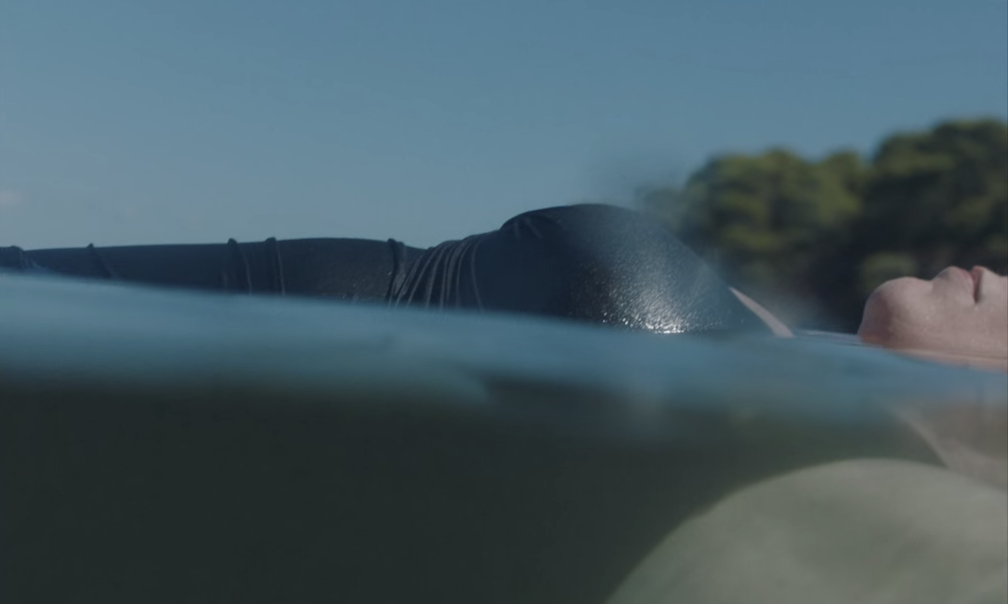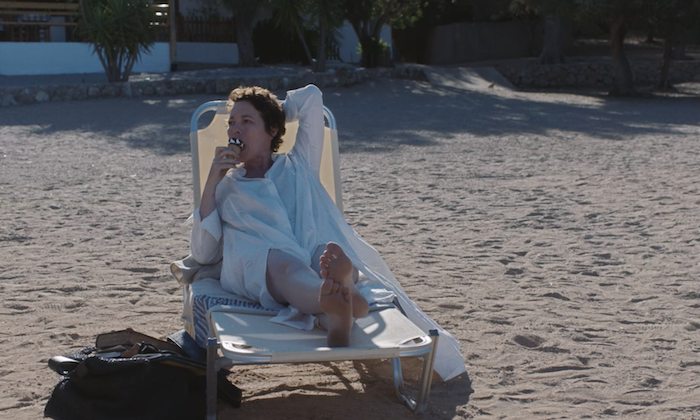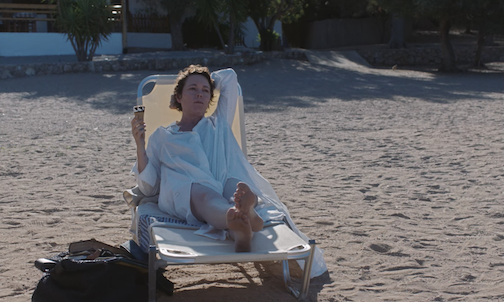|
Tonight, it's the Oscar's. I'm rooting for a few things, a few people. In anticipation of the night, I share the conversation points I would love to get into with Maggie Gyllenhaal, the writer and director of The Lost Daughter and whose film is nominated in three categories. (I'm rooting for her.) I found the film mesmerizing and as soon as I'd finished it I wrote down what most struck me. It came out in bullet-points, as questions I'd want to ask Gyllenhaal. I tidied that list up a bit, but it's still a bit elliptical, like someone snuck a list of questions into some paragraphs. This piece contains spoilers ... Leda is 48 and within her we still see her firm and fiery younger self—a self that surfaces full force in the flashbacks to Leda as a young woman, a mother, married, with two young daughters. Now Leda’s traveling alone and settled into an island village for an extended stay.
Within the first minutes of the film, Gyllenhaal gives us Leda’s body above the surface and below as she floats in the sea, paddles and stands in the water, watching what's around her; all 48 years of her in a bathing suit. In this way we understand two things about Leda: she has a body (which mothers distinctly understand from conception onwards) that engages with the world around her (swimming, dancing); and, she is a woman who is unapologetic in her solitude—at the beach, going to dinner, having drinks, at the cinema, alone. We also learn, more gradually, that Leda sets boundaries: she won't move from her beach chair when asked by the matriarch of a boisterous family overtaking the beach and wanting more room; she confronts the disruptive drunks at the theater; she asks Lyle to leave her to her meal at the restaurant; she won't let Will up to her flat to discuss the tryst plans he has with Nina; she leaves her husband and children. Leda wants things and pursues them in ways we’re conditioned to allow men to do, but not women. Maybe the most striking example is when, in flashback, we see Leda’s thesis advisor come to her dorm door at the academic conference they’re attending after her work was discussed in awed terms by another scholar in his address earlier that day. Now at her door, this advisor appears, humbled and a little bewildered, to ask Leda to join an invite-only dinner reserved for the conference rock-stars. Seated beside her stuffy advisor at the large table, Leda is bidden to join the more flamboyant academic who referenced her work earlier, and she re-seats herself with him and his rowdy pals at some distance from her advisor, relocating to the cutting edge, where all the fun is. Brazenly and unapologetically, Leda grabs onto the praise, going to where the high bar of new challenges and achievement reside. Women don't do this. Men do. Leda did. Leda is also complicated. And weird, and maybe even a little nuts. Is she? As a younger woman, there was a slightly unhinged vibe to her in that what-ignites-me-extinguishes-me kind of way. Now, older, Leda seems slightly more driven by grief than the drive that propelled her toward the independence she grabbed onto earlier in her life. Now, on this island, in a gesture she can’t explain and we may find hard to understand too, Leda surreptitiously steals from a little girl at the beach a doll like her own long ago—a doll that she gave to her young spirited daughter Bianca who marred it and that Leda then chucked out the window where it broke apart on the road below. Now Leda tends to this stolen doll, mothering the doll, cleaning her, preening her, buying her a new outfit; sleeping with her. This looks like grief to me. This looks like the crazy that grief can coax out of us. What is Nina’s attraction to Leda? Of course there's the defiance—Leda stands up to Nina's clan, that band of thugs she's married into. Is there more? Nina had to have trusted Leda an awful lot to openly acknowledge her sexual affair with Will, a betrayal that her husband, whacked on machismo, would surely punish brutally; in fact, Nina goes so far as to want Leda to collude in the orchestration of the next sexual betrayal by way of lending her and Will Leda’s apartment for a few afternoon hours. But Leda’s betrayal of Nina's daughter, stealing Elena's doll, is what crosses the line for Nina: it's okay for a woman to betray her husband, but not her child. Did Leda break the code of motherhood? After all, Leda found and returned Elena to her mother at the beach when the little girl had wandered off and no one could find her. Now Leda’s just stolen the girl’s doll. How did Leda think Nina would react when she confessed to stealing the doll? Any differently? And why didn't she lie? Why didn't she say she found the doll and cleaned her up to return to Elena? Who’s the lost daughter? As a mother myself, I think a lot about my own mother (from whom I surely learned some of how I mother) and what I feel most acutely is being a daughter who’s lost her mother (she died when I was barely a mother myself)—ultimately, leaving me the lost daughter. Is Leda a lost daughter? And we haven’t yet talked about the cinematography, which is sublime. Nor have we talked about the acting, particularly that of Olivia Coleman, which is equally sublime. Coleman’s performance strikes a remarkable balance of depth and levity, giving us a woman who is confident, capable, and possibly a little cuckoo too. Someone both clipped and compassionate, self-actualized and encumbered. Above all, Leda is defiant, and so is Maggie Gyllenhaal. When and where in contemporary culture is the silent consensus so blatantly broken open for us to watch a woman, a rotund one at that, eat an ice cream treat out in the open, lounging on a beach chair, her bathing suit visible though a gauzy beach dress, alone.
0 Comments
Leave a Reply. |
authorzoe welch Categories
All
November 2022
|



 RSS Feed
RSS Feed